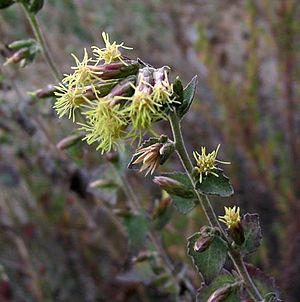California brickellbush facts for kids
Quick facts for kids Brickellia californica |
|
|---|---|
 |
|
| Scientific classification | |
| Kingdom: | |
| (unranked): | |
| (unranked): | |
| (unranked): | |
| Order: | |
| Family: | |
| Subfamily: |
Asteroideae
|
| Tribe: |
Eupatorieae
|
| Genus: |
Brickellia
|
| Species: |
B. californica
|
| Binomial name | |
| Brickellia californica (Torr. & A.Gray)
|
|
| Synonyms | |
|
Synonymy
Brickellia albicaulis (Rydb.) A.Nelson
Brickellia reniformis A.Gray Brickellia tenera A.Gray Brickellia wrightii A.Gray Brickellia wrightii Durand & Hilg. Bulbostylis californica Torr. & A.Gray Coleosanthus albicaulis Rydb. Coleosanthus axillaris Greene Coleosanthus californicus (Torr. & A.Gray) Kuntze Coleosanthus melissaefolius Greene Coleosanthus melissifolius Greene Coleosanthus reniformis (A.Gray) Rydb. Coleosanthus tener (A.Gray) Kuntze Coleosanthus wrightii (A.Gray) Britton Eupatorium axillare (Torr. & A.Gray) Moc. & Sessé ex DC. |
|
Brickellia californica, also known as the California brickellbush, is a type of flowering plant. It belongs to the daisy family, which is a very large group of plants. This plant is known for its many small flowers.
Contents
Where Does the California Brickellbush Grow?
The California brickellbush is found in many places. It grows in Northern Mexico, including states like Baja California and Sonora. It also spreads across much of the Western United States. You can find it in California, Oregon, Idaho, and Wyoming. It also grows in Colorado, New Mexico, and West Texas.
This plant lives in many different natural areas. It can be found in forests, woodlands, and scrublands. It also thrives in grasslands and deserts. It grows at elevations up to about 2,700 meters (8,850 feet).
In California, it is a very common plant. It grows in chaparral areas and coastal sage scrub. You can also see it in oak woodlands and valley grasslands. It even grows in yellow pine forests and parts of the Mojave desert.
What Does the California Brickellbush Look Like?
The California brickellbush is a shrub that branches out a lot. It can grow from 5 centimeters (2 inches) to 200 centimeters (79 inches) tall. Its leaves are fuzzy and have small glands. They are usually shaped like a triangle. The edges of the leaves can be toothed or serrated. Each leaf is about 1 to 6 centimeters long.
The plant's flowers grow in groups at the ends of the stems. These groups are called inflorescences. They contain many small leaves and bunches of narrow, tube-shaped flower heads. Each flower head is about 13 millimeters long. It is covered by flat, wide, purplish-green phyllaries that overlap. At the top of each head, there are several long, white to pink disc florets. This plant blooms from August through November.
After blooming, the plant produces a fruit. This fruit is a hairy, cylinder-shaped achene. It is about 3 millimeters long. It has a pappus made of bristles at one end.
Traditional Uses of the Plant
Some Native American peoples used the California brickellbush. The Navajo and Kumeyaay (Diegueño) peoples used it as a traditional medicinal plant. They used it to help with fevers and coughs. They also used it for issues related to pregnancy.
See also
 In Spanish: Brickellia californica para niños
In Spanish: Brickellia californica para niños

